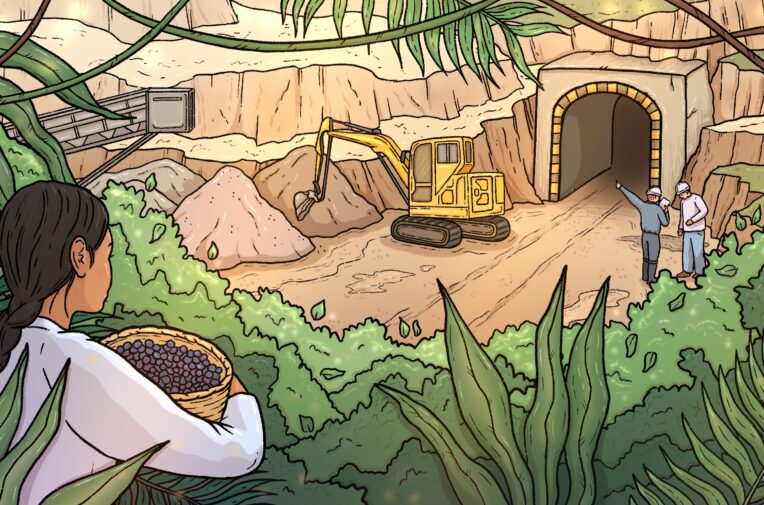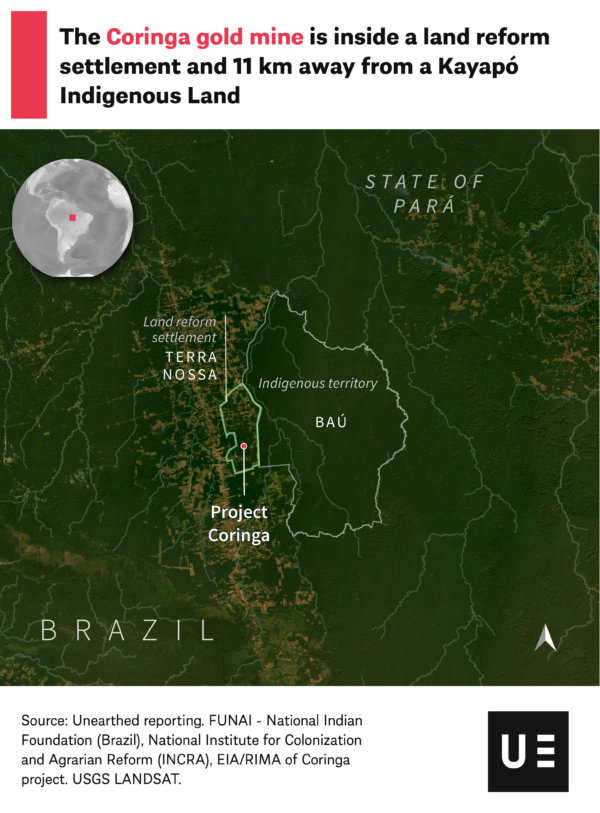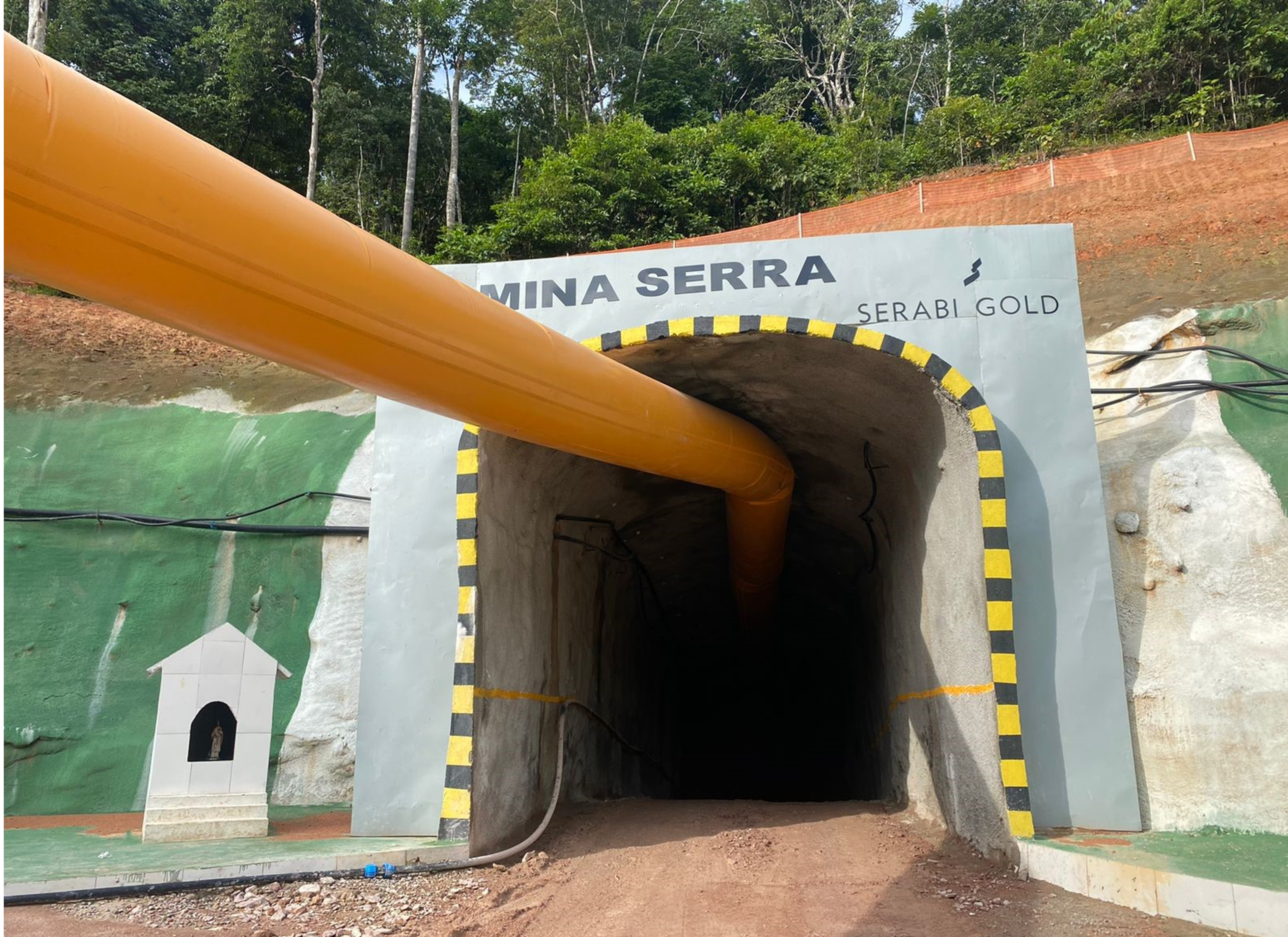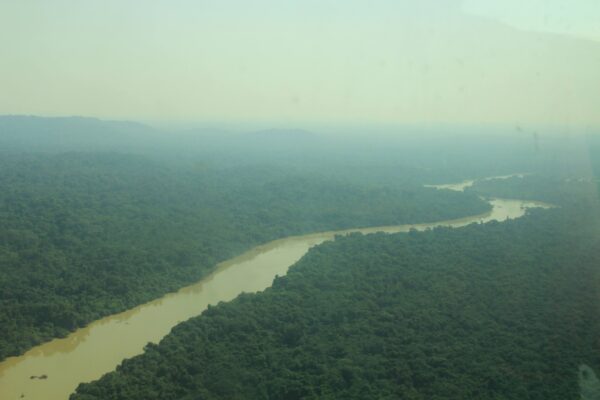
Illustration: Nadia Akingbule
A UK company is mining gold in the Brazilian Amazon on disputed land
Incomplete consultations with Indigenous communities and disputes over land ownership raise questions over Serabi Gold's Coringa mine
A UK company is mining gold in the Brazilian Amazon on disputed land
Incomplete consultations with Indigenous communities and disputes over land ownership raise questions over Serabi Gold's Coringa mine
Illustration: Nadia Akingbule
A British company is mining gold in the Amazon without the permission of the federal land agency, on disputed land, with licences contested by state agencies, and before a nearby Indigenous community has properly been consulted, an investigation by Unearthed and partners has found.
Serabi Gold, which is listed on London’s AIM and the Toronto stock exchanges, has been blasting open 4.5m wide tunnels at the Coringa (Joker) site in Pará state, and last year began trucking ore for processing at a second mine it owns 120 miles away.
But Coringa is sited inside a sustainable farming settlement, owned by federal land reform agency Incra, which told Unearthed it has not authorised the mining. And an official report from Incra seen by Unearthed says that the mine was originally developed through a deal with alleged land grabbers.
Further ambiguity surrounds licences at the Coringa site: a Brazil high court ruled in 2021 that no more licences should be given until an Indigenous impact study is complete, but last year two government agencies renewed existing licences anyway.
In a vulnerable region defined by tension between resource extraction and forest conservation, a tangle of contradictory rulings from different official bodies and complexities over Amazon land tenure has raised questions over whether the mine operation should be suspended.
“Everything [regarding this project] is wrong,” said Ana Carolina Alfinito, a legal consultant at Amazon Watch, a nonprofit organisation working to protect the rainforest and Indigenous people.
Serabi told Unearthed it is “completely comfortable” with its legal position, complies with the Brazilian legal mining framework and has all the necessary permits for Coringa.
Disputed land
The land on which the Coringa mine is situated has a complex past: Until 2003, it was a part of Baú Indigenous Land, where the Kayapó Mekrãgnoti people live. But after years of intense conflicts, the government gave in to pressure from local squatters, loggers and miners and carved off a 3,000 sq km chunk of Baú territory.
Three years later, in 2006, most of this piece of land was converted by Incra, Brazil’s land reform agency, into a “sustainable use settlement” called PDS Terra Nossa. From 2007 to 2011, however, the settlement was periodically suspended due to a lawsuit citing flaws in the environmental licensing process of around 100 settlements in Pará.

Land reform settlements are designed to alleviate rural poverty while helping to protect the Amazon from the advance of agribusiness by opening up small plots to small-scale farmers and people who live off the collection of forest fruits, such as açaí and cupuaçu.
But this part of Pará is in the “arc of deforestation”, a swathe of Amazon characterised by violently contested land disputes. Occupying public land, and then applying retroactively for legal title, is common in the Brazilian Amazon. It is also often directly linked to deforestation: the government is more likely to grant an official deed for the land if the occupant can show they have been using it for cattle or agriculture.
Terra Nossa PDS was intended to provide smallholdings for 1,000 families, but only 300 have been relocated to the 1500 sq km (580 sq mile) settlement, due to the refusal of multiple land grabbers to leave the area, Incra representative Antônio José Ferreira da Silva told Unearthed.
“It is a region of great tension due to land grabbing, marked by deforestation and violence against small farmers and traditional peoples,” said Alfinito.
Even more recently, the region has remained violently contested. In 2019, the nearest town to Coringa, Novo Progresso, made headlines as the epicentre of the “Day of Fire”: a day of coordinated blazes set by ranchers and land-grabbers in support for then-President Jair Bolsonaro. Swathes of Terra Nossa, which experienced many of the fires, have since been transformed into soy plantations.
Amid this murky swirl of contested rights arrived Chapleau, a Canadian gold mining company bought in 2017 by Serabi Gold. Incra says Chapleau signed “mineral research” contracts in 2007, 2013 and 2016 with the family of Benedito Gonçalves Neto – who Incra says are “not recognised by [it] as beneficiaries or legitimate occupants of the project”.
“Everything [regarding this project] is wrong” — Ana Carolina Alfinito, a legal consultant at Amazon Watch
Neto told Unearthed he bought the area surrounding Coringa 20 years ago, before the creation of the settlement. Neto’s business partner Antonio Carlos Machado Matias said that at that time, “nobody had land titles in the Amazon”.
But Incra says their claim is illegitimate. In a 2017 report into land grabbing and mining in the settlement, the land agency says the head of the family, Neto, fraudulently laid claim to a huge area of 68 sq km by registering it as a series of smaller contiguous plots in the names of his family members. The land hasn’t been physically divided or farmed, and Neto and his family don’t even live there, Incra says. In response to Unearthed, Matias confirmed he and Neto live in Bahia state, almost 2,000km (1,200 miles) from Coringa, but said they lived in the area until 2010.

The land agency’s report concluded Neto and associates were not legitimate owners and only engaged in earning royalties from gold mining on the land.
“[Neto] simply appropriated the land and said that it was his,” said da Silva, the Incra official who wrote the 2017 report about mining in Terra Nossa. “We have an [ongoing] administrative process at Incra to take back these areas.”
The most recent contract, from July 2016, established that the mining company Chapleau – later bought by Serabi – would pay Neto’s relatives a single payment of R$21,428 (£3,420), monthly payments of R$1,428 (£228) and royalties from the ore extracted. In exchange, the company could do whatever it wanted in the area, including ore research and mining, deforestation, water collection, and construction of tailings ponds, buildings and a processing plant.
“From the signing of the contracts Chapleau effectively controlled the areas,” stated Incra in the 2017 report.
Brazil’s mining code allows companies to sign agreements with “the owners or occupants” of the land during the mining exploration period and pay royalties, regardless of whether they can prove that they own the land.
Unearthed understands that Serabi suspended payments to Neto when the company bought Chapleau in 2017 because Neto did not have proof of land ownership. But in an email, Incra also confirmed to Unearthed that “to date, Incra has not authorised research and mining operations in the PDS Terra Nossa”, and is also not receiving payments from Serabi.
In fact, the current situation at Coringa appears to be that a British company is extracting gold ore from the Amazon without paying royalties or fees to anyone at all.

“We don’t even have dialogue with Serabi any more”, said Antonio Matias, Neto’s business partner, adding that Serabi stopped the payments once it bought Chapleau.
“They should be paying us royalties,” he added. “[But] since there is an Incra decree, I have no way of saying that I have dominion over the area. So what can I do? Nothing.”
Matias said that he and Neto had applied to Incra for official titles three times and had been rejected each time, because of the sustainable land use settlement.
After Unearthed contacted Serabi, it released a statement to investors acknowledging that ownership of the land on which Coringa is sited “has been subject to various challenges over the years”. The statement did not mention the Terra Nossa settlement, and claimed Incra had yet to “determine the legitimate title holder”. It said: “payment will be made to the appropriate title holder as and when title is formally confirmed.”
Serabi is not the only company seeking access to the gold beneath Pará’s land reform settlements. In 2021, Incra made a R$1.3million (£207,000) deal with the Canadian miner Belo Sun to reduce the size of a settlement where 600 families reportedly live, to make way for an open-pit gold mine. Residents were allegedly not told that negotiations with Belo Sun were happening. Weeks later, then-President Jair Bolsonaro issued a ruling allowing the land agency to sell areas in settlements to mining companies.
Incra says that Serabi is now citing this ruling to request that Incra approves the Coringa project. “Whatever people think of him outside Brazil, [Bolsonaro] has been great for the infrastructure and the mining industry as a whole”, said Serabi’s CEO, Mike Hodgson, in an interview in November last year.
Incra told Unearthed that Serabi’s request is being analysed. In its statement to shareholders, Serabi says it has been in “regular contact with Incra since acquiring the project in 2017.”
The licences battle
Illegal land grabbing is not the only controversy linked to the Coringa mine. Brazil’s public prosecutor, MPF, has alleged that Chapleau failed to adequately consult the Kayapó Mekrãgnoti community, which lives in the Baú Indigenous territory seven miles away, before beginning to explore. The public prosecutor began court proceedings to stop the mine in 2017, citing the risk of pollution to the Curuá river, which flows through the Baú Indigenous lands. For the Kayapó, the prosecutor argued, the river provides “great aquatic biodiversity, on which the indigenous people depend for their survival, in addition to the use of the spring for their entire traditional life cycle.”
“The company should have consulted us first. We have the right to be heard,” said Bepdjo Mekrãgnotire, who lives in the Baú Indigenous territory.
Mekrãgnotire said that he was collecting brazil nuts near his village last year, when he heard distant explosions and realised the mine was active.
“The noise startled us,” Mekrãgnotire, a member of the Kayapó people who works with NGO Kabu Institute, added.
In December 2021 the TRF-1 (a federal high court based in Brasília) ruled that Pará State Environmental Secretary, Semas, and the National Mining Agency, ANM, should “refrain from granting any licence or authorisation to the Coringa Project” until the company concluded a consultation with the Indigenous population. According to Serabi, a final report on the consultation will be presented to authorities “in the next few weeks”.
Despite the court’s ruling, both agencies renewed Coringa’s licences last August. In an email sent to Unearthed, Semas said it was an automatic renewal, not a new licence. ANM told Unearthed its licence was previously renewed, also “automatically”, but expired on February 7 and had not been renewed again after that date, due to the court decision. “There is no current authorisation for mining in these areas”, stated the agency, which said the company was notified of the decision on February 8.
“The company should have consulted us first. We have the right to be heard” — Bepdjo Mekrãgnotire
However, Serabi says that under Brazilian law the licenses are automatically extended as long as renewal applications have been submitted. A statement issued in March said: “The company confirms that renewal applications have been submitted within the stipulated time frames and that no notifications have been received from the issuing authorities that renewal will not be approved. Accordingly, these licences, which had an initial expiry date of 8 August 2022, remain valid.”
The MPF was unaware that the licences had been renewed, and Serabi was still operating. When informed by Unearthed, the prosecutor said the renewed licences were in “direct violation of the judicial decision” and asked the high court to determine the “total paralysation of the company’s activities”. If the high court concludes ANM and Semas disobeyed its ruling, the agencies may face a fine of R$50,000 (£7,960) per day of non-compliance.
Serabi’s recent statement to investors declared it planned to continue processing ore at a different site, and had decided that any future tailings storage at Coringa would be “dry” to “minimise any concerns of the communities that are dependent on the Curuá River regarding the potential for pollution.”
Despite a complex operating environment, Serabi shows no signs of slowing down. According to its public reports, 1,013 ounces (28.7 kg) of gold were extracted from Coringa in 2022. Once in full operation, the company expects to reach 38,000 ounces per year — over 1 tonne, the equivalent of around US$70 million — doubling the miner’s current production.
Unearthed understands that after processing and refining, some of the Coringa gold is exported.
In an email, Serabi said it “operates and complies with the Brazilian legal mining framework, we have all the required permits for our trial mining operation at Coringa and we are completely comfortable with our legal position and behaviour in relation to the ongoing disputed land ownership within which Coringa sits. Serabi has been operating in Para State for over 20 years and remains committed to working with all stakeholders, supporting local communities and operating in an environmentally sensitive manner.”
Felício Pontes Junior, the public prosecutor who has been accompanying the lawsuit in the high court, said the case demonstrated that some foreign companies can show a disregard for Indigenous rights and local laws.
“I hope that there will be an exemplary punishment to this company and that this will serve as an example to the other mining companies, especially the foreign ones, which today settle in the Amazon without respect to the basic rights of the traditional peoples.”

